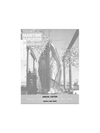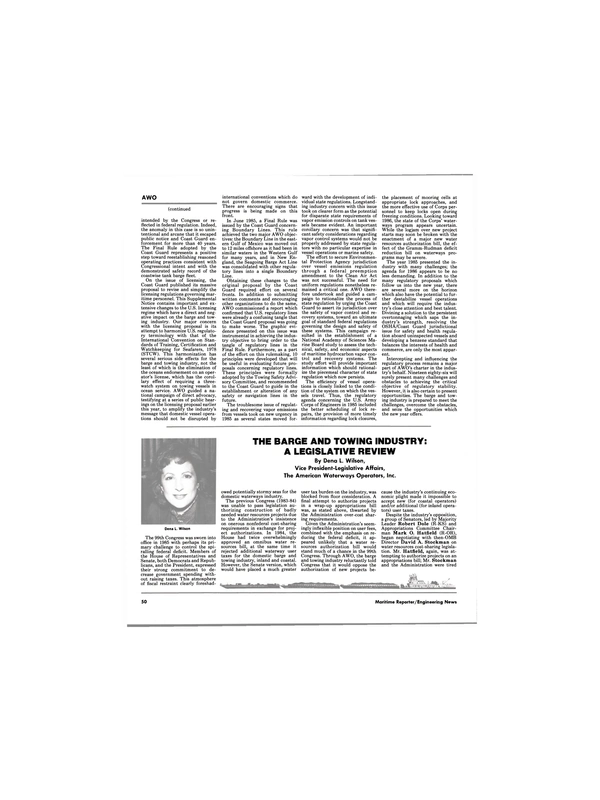
AWO: PROMOTING, PROTECTING AND DEFENDING THE BARGE AND TOWING INDUSTRY
The American Waterways Operators (AWO), is the national trade association representing the inland and coastal barge and towing industry, and the smaller shipyards which service that industry. Since 1944, when AWO was founded, the association has worked at defining, supporting and promoting its members' interests and operations. In addition, AWO works towards achieving a keen public awareness of the marine transportation industry's contribution to the overall American economy.
AWO's primary mission is to function as the informed, persuasive and collective voice to the federal government, to the media and, when necessary, before the courts, speaking for the united interests of its varied and ever-expanding member companies. AWO spokesmen frequently testify before Congressional committees and maintain a continuous dialogue with the federal agencies whose activities affect the bottom line of their member companies.
AWO seeks to keep federal legislators up-to-date and informed—to ensure that legislative actions reflect thorough consideration of the potential impact on the economics and productivity of the inland and coastal barge and towing industry.
And, AWO provides input to the executive branch agencies—primarily the Coast Guard, Corps of Engineers, OSHA, MarAd and EPA—that issue regulations on local and national levels that affect its member companies' ability to operate.
The membership of AWO includes all segments of the inland and coastal barge and towing industry including tugboat, towboat and barge operators, and the shipyards that build and repair the industry's vessels. The association's growing affiliate membership is comprised of suppliers, manufacturers, insurers, bankers, attorneys and other associations and businesses which make up the marine industry.
AWO assumes the task not only of monitoring and interpreting actions which may affect the association's members, but also of anticipating important developments and responding to them in a timely and effective manner. Moreover, AWO provides its members with up-todate reports on issues of concern, and participates with federal officials during the key developmental stages on legislative and regulatory proposals which would affect the industry. Their main objective is to demonstrate to national policymakers and to the general public that barge commerce is a safe, fuel-efficient and cost-effective method of transportation that is a key part of the nation's economy.
The membership of AWO is divided into five regional organizations which, together, covers the entire United States. Each region meets as necessary to discuss current issues, to exchange views with officials from federal and state agencies and to develop plans for the future. In order to meet the regional needs of the association, AWO staff representatives located in New York City and New Orleans provide vital membership services both in their regions, as well as to the national organization. The AWO regional staff maintains a close working relationship with local officials and regional staff of the various federal agencies.
Reflecting its national character, AWO member companies are located along the banks of all major U.S inland waterways, and on the shores of the Atlantic, Pacific and Gulf Coasts. The association's concerns and influence span the country from Miami to Anchorage, from Pittsburgh to Corpus Christi. This national network provides for the effective communication and member action that is essential to the association's effectiveness.
AWO members serve on any number of AWO committees and conferences— which provide the opportunity for members to take an active role in directing policy formulation and the decision-making process of the association. The organizational structure of AWO's committees and conferences is dynamic, with task forces, special committees, ad hoc groups formed or dissolved as needs dictate—to meet quickly the rapidly changing needs of the industry.
AWO committees meet often, rotating meeting sites among differnt cities.
Committee members meet directly with Administration, regulatory or Congressional officials, providing valuable industry advice and consultation on important legislative and regulatory decisions to those who need to know.
The many issues covered by AWO committees and conferences vary as widely as the interest and expertise of AWO members, ranging from developing association policies and strategies on major waterways legislation, to refining Coast Guard regulations, from exchanging safety and training ideas to planning media strategy. AWO committees and conferences provide the vehicle for member involvement in these and other issues that directly affect its member companies' future.
Looking back on 1985, AWO president J o e Farrell notes that "The long and stormy voyage through the water transport industry's worst depression in its modern history continued without relief." Mr. Farrell said that published statistics reveal that fully 18-20 percent of the companies which make up the industry ceased to exist between the beginning of 1984 and the end of 1985, and that "This year begins by beckoning little hope for any substantial turnaround." Nevertheless, Mr. Farrell said that there was no scarcity of challenges for AWO in 1985—in the Congress, in the executive branch and in the Courts—and that many of these challenges have serious potential for the industry his association represents.
"The shower of federal regulatory and legislative initiatives, with all their potential impact on the industry, continued to rain-down apparently unconnected to the severe economic plight of the industry," Mr.
Farrell said.
The year 1986 offers a full plate of challenges to Mr. Farrell and AWO's highly-competent staff.
Aside from the continuing debate over the threat of new user taxes, some of the issues highest on AWO's agenda for 1986 include: maintaining the sanctity of the Jones Act; solutions to overtonnage in the barge fleet; developing ways to expand U.S. exports of bulk products; raising the industy's public profile; maritime liability legislation; Coast Guard-OSHA jurisdiction for regulating uninspected vessels, and many others.
Of new and growing concern to AWO's members and staff is the Gramm-Rudman bill enacted late last year that forces about $200 billion in federal budget reductions over the next five years.
"Gramm-Rudman provides no method and little guidance on how to make the cuts," Mr. Farrell stated. "And at the same time it stimulates partisan confrontation and certain division between the executive and legislative branches in the process. What is certain is that our industry, like all others, will not escape the shadow of Gramm-Rudman." These issues, and more, make the success and effectiveness of AWO's mission all the more important in the coming year. According to Mr.
Farrell, the economic plight of the industry, along with a full legislative and regulatory agenda, are all compelling reasons for increasing the membership of AWO, and thereby increasing even further the effectiveness of the industry's advocacy in Washington.
"I would propose that anyone contemplating joining AWO look at it in the same way he or she would look at a business investment. A business person doesn't make an investment unless they expect to get a return on that investment. And while the return AWO provides is less obvious than commercial gain, In 1985, the depressed state of the barge and towing industry further emphasized the longstanding need to secure a reasoned and stable regulatory environment for domestic marine transportation. This elusive goal took on greater importance as the dilemma of too many vessels chasing too few cargoes continued unabated. However, without apparent recognition of the industry's precarious economic condition, federal regulatory proposals continued to be generated by the agencies of government, often carrying with it is nonetheless a real return, one which hits right on a company's bottom line," Mr. Farrell said.
"There is no doubt that the federal government on an annual basis makes hundreds of decisions which land right on the barge and towing industry's bottom line. Everyone involved in this industry needs to know what the government is thinking about, what they're planning to do, and as a member of AWO to intercept that process in a way that effectively represents their company's interests. That translates directly to dollars and cents on any issues decision," he said.
Read AWO: PROMOTING, PROTECTING AND DEFENDING THE BARGE AND TOWING INDUSTRY in Pdf, Flash or Html5 edition of March 1986 Maritime Reporter
Other stories from March 1986 issue
Content
- BUILD AND CHARTER' —A VITAL STEP IN THE RIGHT DIRECTION page: 6
- Navy Adding 13 Ships Costing $206.7 Million To Ready Reserve Force —Four To Be Converted page: 7
- Lips Designs Detachable Blade Propellers For Amoco page: 7
- Gary Carlson Joins Midland-Ross Corp. As Group Executive VP page: 8
- WATERCOM Telecommunications System To Be Fully Operational This Year page: 8
- $31-Million Development Project Begins At Port Of Miami page: 9
- B&B Dredging Offers Color Brochure On New Dredge Design page: 10
- Moss Point Marine Converts Tanker Into Oceangoing Grain Barge page: 10
- Grow Group Announces Merger Of Devoe Prufcoat And Napko Corporation page: 10
- Todd's San Pedro Yard Launches Guided Missile Frigate 'Davis' page: 11
- LATEST CHANGES IN U.S. NAVY SHIPBUILDING PROGRAM page: 12
- NEW NAVY BUDGET: OVER $100 BILLION page: 22
- NAVY CONTRACTS page: 30
- USCG Awards Aquafacs Inspection, Maintenance And Repair Contract page: 33
- Teleflex RMVAs Eliminate Corrosion, Misalignment And Binding Problems page: 33
- Marine Corps League's 6th Annual Exhibition Set For July 22-24 In D.C. page: 36
- 1986 VALVE EQUIPMENT GUIDE page: 38
- Fincantieri Awarded Orders For Seven Ships page: 45
- Japan Radio Offers New Literature On Products— GSC-80 ODARS And JLR-4000 GPS Navigator page: 45
- Bonner Elected Chairman, Solley Vice Chairman Of VMA page: 46
- Infrasonik Receives Order For Soot-Removal Systems From U.S. Shipping Line page: 47
- AWO: PROMOTING, PROTECTING AND DEFENDING THE BARGE AND TOWING INDUSTRY page: 48
- INTERCEPTING AND INFLUENCING THE REGULATORY PROCESS page: 49
- THE BARGE AND TOWING INDUSTRY: A LEGISLATIVE REVIEW page: 50
- THE INVISIBLE INDUSTRY page: 52
- R.J. Paine Named Marine Marketing Manager At Penske page: 54
- Intertrade Given Additional Navy Contract For Marine Fenders page: 54
- Stellar Technology's Battleship Spare Parts Depot Locates In Camden page: 55
- Coastal Corporation Purchase Of Texaco Terminal And Pipeline Interest Expands Market For Belcher Oil page: 56
- Big Heavy-Lift Cargo Carrier Delivered By Hitachi Zosen page: 56
- Free 28-Page Color Catalog On Bearings Offered By Duramax page: 58
- Kockums To Retrofit Swedish Sub With Air-Independent Stirling Engine page: 59
- Curtis Bay Towing Elects Swensen VP And General Manager page: 59
- Hempel Group Founder Dies At Age Of 91 page: 60
- Duff And Butera Hired At CDI Marine Company page: 60
- Record Well Depth For Floating Drilling Rig Set By ODECO's 'Ocean Rover' page: 61
- Michell Bearings Appoints Peter Pagan President page: 61
- TDI Introduces New Infrared Thermometer Kit page: 61
- MarineSafety Initiates Tug-Barge Simulator Training Course page: 62
- Alden Introduces Series Of Marinefax Recorders page: 62
- New Aeroquip Bulletin Explains Hose Assembly Machine Advantages page: 64
- Wtirtsilti Delivers Advanced Icebreaker To Finnish Board Of Navigation page: 64
- Congressional Conferees Agree To Appropriate $228.4 Million For Strategic Sealift Program page: 65
- SNAME Chesapeake Section Meeting Hears Paper On SWATH Survey Ship page: 65
- Garrett Division To Participate In Design Of New Engine For Mid-Sized Navy Ships page: 68
- Lindenau Installs Firefighting System On Offshore Supply Boat page: 69
- Schaffran Offers Free Literature On Propellers And Shaft Liners page: 69
- Marco-Seattle Awarded Cargo Ship Conversion page: 70
- Ellicott Machine Forms New Engineering Company —Morse Named Manager page: 70
- Wartsila Delivers Passenger/Vehicle Ferry To EFFOA-Finland Steamship page: 75


